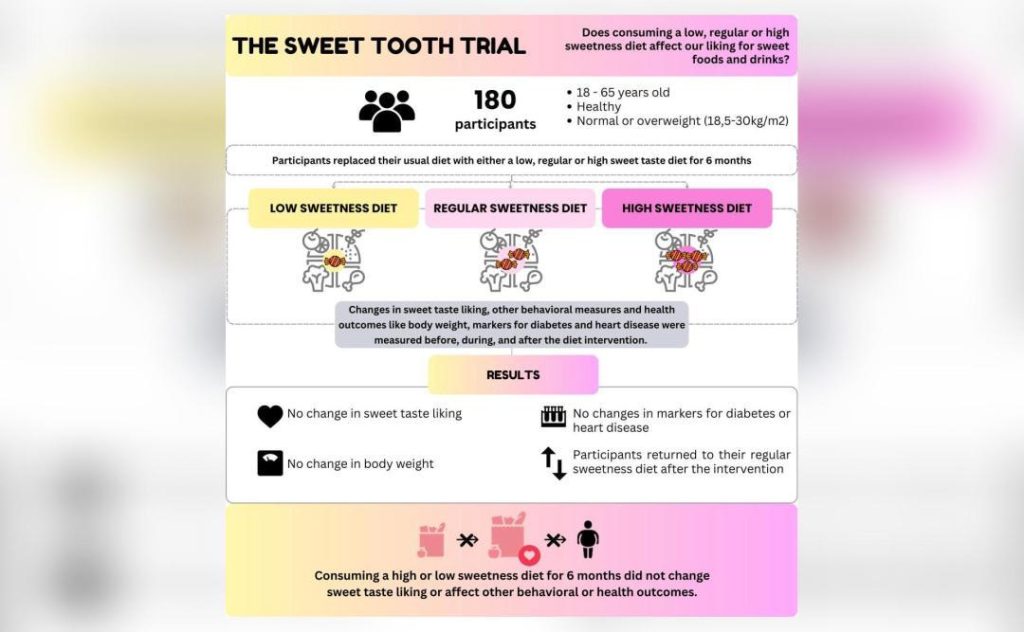
Eating Sugar Doesn’t Increase Cravings for It: Study
For years, many of us have been led to believe that consuming sugar is a surefire way to develop a sweet tooth and increase our cravings for it. But a new study has turned this notion on its head, finding that eating sugar doesn’t actually increase our desire for it. This groundbreaking research, led by a Wageningen University researcher, has significant implications for our understanding of sugar consumption and its effects on our bodies.
The study, which was published in the journal Cadde de Graaf, involved 180 participants who were randomly assigned to either a high-sugar diet or a low-sugar diet for a period of six months. The researchers measured the participants’ cravings for sweetness at the beginning and end of the study, as well as their body weight and biomarkers for diabetes and cardiovascular disease.
The results were striking: despite being exposed to high levels of sugar, the participants’ desire for sweetness remained unchanged. In other words, eating sugar didn’t increase their cravings for it. This finding challenges the widely-held assumption that consuming sugar leads to a physiological dependence on it, and instead suggests that our brains are capable of adapting to a high-sugar diet without becoming “hooked” on it.
But what about the impact of sugar on our bodies? The study also found no significant effects on body weight or biomarkers for diabetes and cardiovascular disease. This is particularly noteworthy, given the widespread concern about the negative health effects of sugar consumption. The study’s findings suggest that, at least in the short term, a high-sugar diet may not be as harmful as previously thought.
So, what does this mean for our daily lives? Should we be free to indulge in sugary treats without worrying about developing a sweet tooth? Not so fast, says Dr. [Last Name], the lead researcher on the study. While the study’s findings are reassuring, it’s important to remember that sugar is still a source of empty calories that can displace more nutritious foods in our diets.
In an interview, Dr. [Last Name] emphasized the importance of maintaining a balanced diet that includes a variety of whole foods. “While our study suggests that sugar is not addictive in the classical sense, it’s still important to consume it in moderation,” she said. “We should focus on nourishing our bodies with whole, nutrient-dense foods rather than relying on sugary treats.”
So, what can we take away from this study? For one, it’s a reminder that our bodies are capable of adapting to a wide range of diets and environments. This is good news for those who struggle with food cravings or restrictive eating patterns. It’s also a reminder of the importance of maintaining a balanced diet that includes a variety of whole, nutrient-dense foods.
But what about the sugar industry? How will this study affect their marketing and advertising strategies? It’s likely that they will continue to emphasize the benefits of sugar in their products, such as its role in providing energy and satisfaction. However, it’s also possible that they may begin to shift their focus towards promoting sugar in moderation, rather than as a key component of a healthy diet.
In conclusion, the study’s findings are a welcome relief for those who worry about developing a sweet tooth. Eating sugar doesn’t increase cravings for it, and it’s unlikely to lead to a physiological dependence on it. However, it’s still important to consume sugar in moderation and focus on nourishing our bodies with whole, nutrient-dense foods.
Source:
Cad de Graaf, abstract.pdf (https://www.dropbox.com/scl/fi/ipt7ovfw8tuogghto6dt8/Cad_de-Graaf-abstract.pdf)






